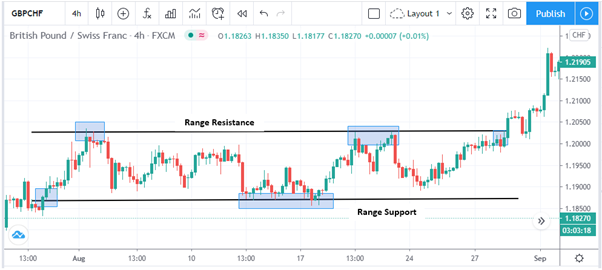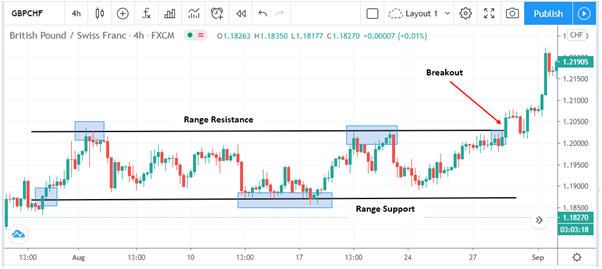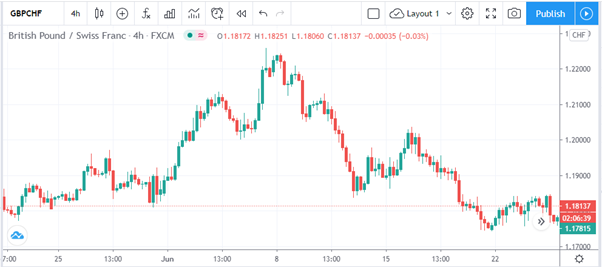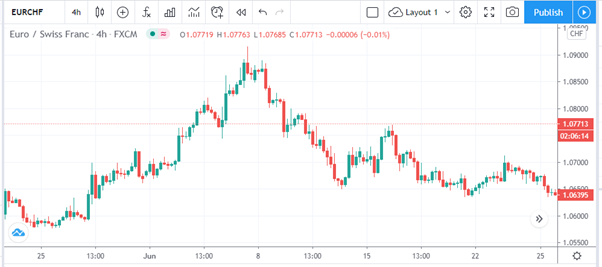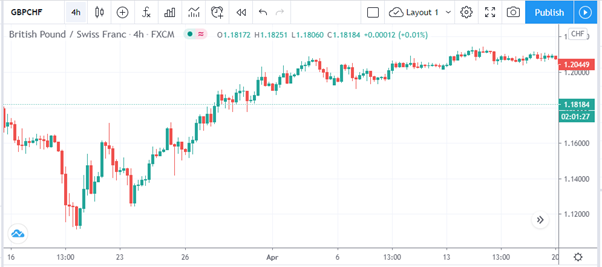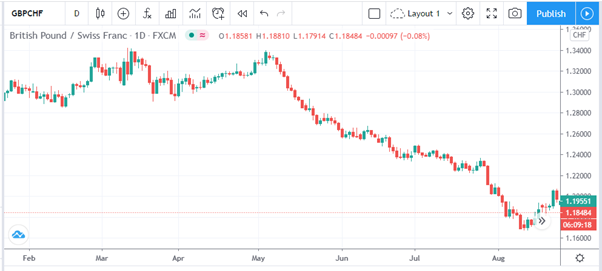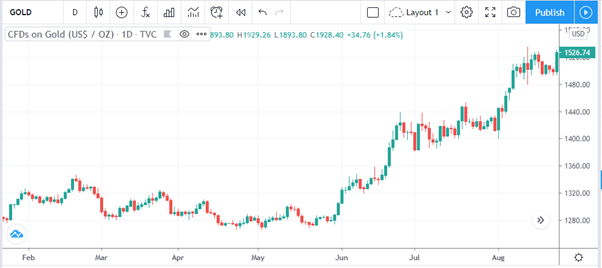GBP/CHF features two highly sought and traded currencies in the world. It is characterized by a stability that is strengthened by the economic and geographic proximity of Britain and Switzerland. The pair’s lower volatility is very popular among traders looking to steadily grow their profits without taking on undue risk.
To trade GBP/CHF:
- Learn the fundamentals of trading GBP/CHF
- Open an online forex brokerage Account
- Find a trading and charting platform
- Analyze GBP/CHF
- Create a plan and strategy for trading the pair
- Place your order
- Monitor the order and close your position
Because the Swiss franc is a safe haven currency, GBP/CHF is most attractive during periods of market turmoil and uncertainty. With a good strategy and sound knowledge of the market, trading the pair can be rewarding.
Table of Contents
Currency Pair Chart and Profile
GBP/CHF is the forex quote for the British pound against the Swiss Franc. The pound is one of the world’s premier reserve currencies and it represents one of Europe’s largest economies. In turn, the Swiss franc is used as a reserve currency across the world. The GBP/CHF pair is also known as the Pound Swissy.
The economies behind GBP/CHF
The British economy is ranked 6th in terms of global GDP and it is the third-largest in Europe. Agriculture and energy production are the economy’s key production industries, but the service sector comprises a significant part of GDP output.
Switzerland is the world’s 20th-largest economy. The economy is highly diversified, with strong financial, service, and manufacturing sectors. It’s also fueled by the agriculture and tourism sectors. Switzerland maintains low unemployment rates and a low national deficit, both of which make the economy strong.
Monetary policy in Switzerland is determined by the Swiss National Bank (SNB), which is also the sole issuer of the Swiss franc. Monetary policy on the British side is set by the Bank of England (BoE).
What factors affect the movement of GBP/CHF?
Both the British pound and Swiss franc have excellent stability, but like other world currencies, they are affected by certain factors. The factors that influence the movement of the two currencies also influence the movement of GBP/CHF.
- GBP/CHF is mainly affected by economic news coming in from Britain and Switzerland. When trading this pair, it’s important to monitor economic data, including employment figures, interest rates, inflation, and retail sales. It’s also prudent to keep track of U.S. dollar movements since GBP/CHF is related to the dollar by the cross rate.
- The pair is highly vulnerable to political and economic events that trigger highly correlated price action across currencies, equities, and bond markets around the world.
- The Swiss franc is particularly sensitive to political and economic events taking place across the world. For example, the franc’s volatility can increase as soon as the demand for the currency exceeds supply. This means that unpleasant geopolitical or financial events happening in the world will likely have an impact on the movement of GBP/CHF.
Is GBP/CHF an exotic pair?
The GBP/CHF pair consists of two major currencies. However, the pair itself is not a major; it’s a minor pair, and one of the pound crosses.
Pros of trading GBP/CHF
Trading GBP/CHF provides several benefits.
- Trading U.S. dollar pairs can be difficult. The U.S. is the world’s largest economy and news about its economy can cause spikes and disproportionate risk in the market. GBP/CHF separates your trades from U.S. news while still providing attractive trading opportunities.
- GBP pairs seldom stagnate – they either show an uptrend or downtrend.
- GBP/CHF has substantial predictability. This is because the Swiss franc is the most “news resistant” of the major currencies.
- The GBP/CHF cross provides decent volatility with a record of no unexpected moves that could blow up your position. Trading the pair is relatively simple because Britain and Switzerland have common industries and similar economic factors.
Cons of trading GBP/CHF
Despite its stability, GBP/CHF does present some difficulties.
- As a minor currency pair, transaction volume is lower compared to major pairs. This often results in lower liquidity.
- The lower liquidity means that spreads on GBP/CHF can be quite wide.
The Best Time to Trade GBP/CHF
GBP/CHF is most active during the London trading session, which is open from 8 am to 4 pm GMT. Although the pair can see some movement during the New York session, the crucial moves will likely happen during the London session. This is because when it comes to trading the British pound, the London session is highly influential that there is usually little point in trading other sessions.
Best Trading Strategies for GBP/CHF
Carry trading
Carry trading is a trading strategy that allows traders to make a profit even when the market is stable. This is because the strategy doesn’t rely on currency price movements, but rather on a currency pair’s interest rate differential.
This strategy involves borrowing a lower-interest-rate currency and simultaneously buying another currency with an interest rate that is higher. For every day that a trader carry trades, the broker pays out an interest according to the differences in the currencies’ interest rates. With leverage, the profits can add up significantly.
Historically, the relative stability of the Swiss franc has opened up opportunities for carry trades, especially when the pound experiences rapid changes in value. The Swiss franc is traditionally known as a low-interest currency relative to the British pound, hence it makes for a good funding currency.
The funding currency, which is normally characterized by the lower interest rate, funds the carry trade. This means that when undertaking a GBP/CHF carry trade, you short the Swiss franc.
Swing trading
With swing trading, a trader usually holds a position for several days or even weeks. By doing this, the trader aims to profit from short-term price patterns. Swing trading normally involves trading a range of price swings.
The general assumption is that the price will continue moving within the range. This means that once you have identified a range, you could go long at the range support level and sell at the range resistance.
Swing trading offers many opportunities since it involves trading both sides of the market – you can go long and short. The biggest disadvantage of the strategy is that it is susceptible to sudden breakouts that could result in sharp losses. However, you can also trade these breakouts.
Breakout trading
The breakout strategy centers on the price clearing a level of support or resistance with increased volume. When using the strategy, you could go long after the price breaks above resistance. Conversely, you could go short once the price breaks below support.
It’s important to plan your exits when you’re trading breakouts. You can use the pair’s recent performance to establish a reasonable exit price target. For example, using chart patterns, you can determine a target by calculating the average of recent price swings.
The values of the British pound and the euro are deeply rooted in the geographical, political, and socioeconomic relationships between the E.U. and the U.K. The pound and the euro tend to show a strong positive correlation. Consequently, GBP/CHF is closely correlated to EUR/CHF.
GBP/CHF is also strongly correlated to GBP/JPY. Both the Swiss franc and the Japanese yen are considered safe haven currencies mainly because of Switzerland and Japan’s political stability. Additionally, trade between the two countries has always been strong and Japan remains Switzerland’s main Asian trading partner.
Correlation of GBP/CHF with other commodities
The value of the Swiss franc is strongly linked to gold prices. The reason for the strong relationship is that over a significant proportion of Switzerland’s money is backed by gold reserves. When gold prices increase, those of CHF increase as well, and vice versa. As such, gold has a negative correlation with GBP/CHF. When the price of one rises, the value of the other falls.
Related Questions
Is CHF pegged to EUR?
Although the Swiss National Bank pegged the Swiss franc to the euro in 2011, this is no longer the case. The Swiss central bank scrapped the currency peg in 2015. The peg was introduced in response to investors buying large amounts of the strong franc as a safer alternative to the dollar and euro.
Are EUR and GBP the same currency?
EUR and GBP are entirely different currencies. Each of the two currencies has its own symbol and historically, the euro has been weaker than the pound. The euro is the official Eurozone currency while the pound is Britain’s official currency. Among the most widely traded currencies in the financial market, the euro comes in second and the pound is fourth.
Why is the British pound so strong?
The British pound is among the world’s strongest currencies. Some top reasons for the currency’s strength include:
- Lower inflation rates. Compared to many countries, Britain has a low inflation rate, which means its purchasing power is higher.
- Investors’ speculation. Because the pound has been strong for a very long time, investors believe that the currency is worth investing in. The currency will likely remain strong as long as investors believe the currency is strong.
Sentiment. Similar to speculation, the general sentiment is that the British pound has high value. This tends to keep the currency strong. If the opinion begins to decline, the value of the pound will go down as well.
